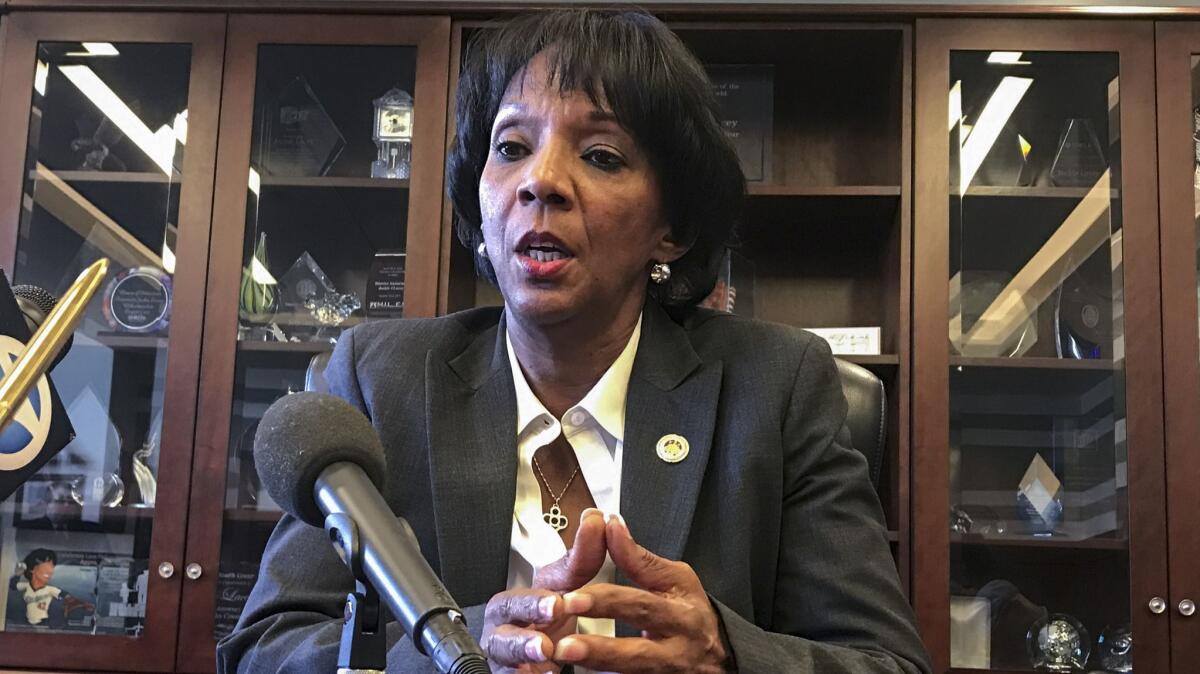Editorial: More groups are spending money on district attorney races. That’s a good thing

- Share via
The most powerful players in the criminal justice system are district attorneys and sheriffs elected at the county level. Prosecutors, especially, shape the system by making basic decisions like whether to prosecute a borderline case, how hard to drive bargains over guilty pleas and sentences, and whether to oppose bail. In the aggregate, those choices dictate how effective the justice system is at keeping us safe and preventing offenders from repeating their crimes.
That power too often goes unrecognized at the ballot box in places like California, where most district attorneys continue to tout 1990s-era “tough-on-crime” policies even as their voters turn toward more pragmatic and constructive approaches to crime and public safety.
It’s an odd inconsistency. By wide margins, Californians modified the state’s three-strikes law to ensure that people are not imprisoned for life after committing petty crimes (Proposition 36, 2012); made drug crimes and low-level property crimes misdemeanors rather than felonies (Proposition 47, 2014); gave judges rather than prosecutors the power to decide whether a juvenile should be tried as an adult, and offered qualified prison inmates a chance at parole in exchange for participating in rehabilitation programs (Proposition 57, 2016).
Yet voters continue to elect prosecutors and law enforcement officials who end up leading the campaigns against those measures, or who drag their feet when it is time for them to be implemented. Or who push back against other reforms like eliminating cash bail, or seeking diversion away from the justice system and toward treatment for the addicted or mentally ill.
There are various reasons for this cognitive dissonance. The most important is that D.A. and sheriff’s elections are generally low-profile, one-sided affairs. While incumbents seek backing from law enforcement and prosecutors’ unions, which for years have dominated campaign spending and messaging, candidates with opposing viewpoints can rarely raise enough money to pose effective challenges. That makes for an excessively narrow debate.
For decades, candidates who took the most unyielding line on punishment could count on support from the California Correctional Peace Officers Association — the prison guards’ union. But the organization changed leaders, tempered its message and altered its strategy for campaign spending about a decade ago. In its absence, district attorney and sheriff’s unions have stepped up their political organizing and spending. For example, major funding for a proposed ballot measure to roll back two important criminal justice measures — Propositions 47 and 57 — comes from the Los Angeles Police Protective League (the union of rank-and-file LAPD officers) and the Association of Los Angeles Deputy Sheriffs (its counterpart union of county sheriff’s deputies). Locally, while District Attorney Jackie Lacey has for the most part stayed quiet on criminal justice reform measures, while the L.A. Association of Deputy District Attorneys — the county employee union for prosecutors — has been a vocal critic of the measures and an outspoken supporter of rollbacks.
That’s the context in which we ought to view large campaign expenditures in D.A. races, in California and across the nation, from organizations funded by billonaire hedge fund manager George Soros.
Soros is attempting to elect a new wave of district attorneys who will use their power in the criminal justice system to solidify recent criminal justice reform practices and extend them across the country. Prosecutor and law enforcement unions have tried to demonize him, warning that our elections could be captured by an outsider with money at his disposal to sway elections.
It’s certainly the case that under our current campaign finance system, wealthy donors can make a difference with virtually unregulated donations to independent expenditure campaigns.
But that’s the arena in which U.S. campaigns play. Big money has been swaying elections for decades. Until the nation can reach consensus on a better system that limits the power of campaign money, especially from individual donors, corporations and labor unions, we’re left with a system in which the candidate or cause with the most money talks the loudest. As long as that’s the case, we can’t help but feel a measure of relief that the money that has for decades spoken up for tough-on-crime laws is now being matched by money that speaks up for ending cash bail, excessively punitive sentences and unaccountable police shootings, and for more thoughtful choices in filing criminal charges or conducting plea bargains. As always, the ultimate outcome is left in the hands of voters — who have increasingly embraced criminal justice reform.
Follow the Opinion section on Twitter @latimesopinion and Facebook
More to Read
A cure for the common opinion
Get thought-provoking perspectives with our weekly newsletter.
You may occasionally receive promotional content from the Los Angeles Times.









